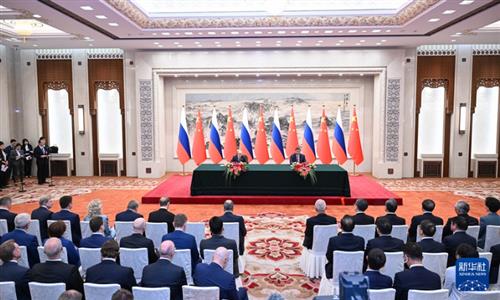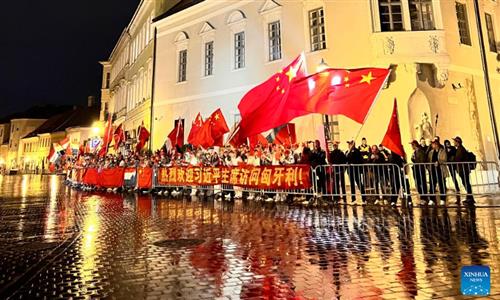Sound and steady growth of China-Russia relations benefits BRICS and the world: Global Times editorial

Signs of the 16th BRICS Summit display at the Kazan Kremlin in Kazan, Russia, on October 20, 2024. The summit will be held in the city from October 22 to 24. Photo: He Zhuoqian/Global Times
On Tuesday local time, Chinese President Xi Jinping arrived in Kazan, Russia, by special plane to attend the 16th BRICS Summit at the invitation of President of the Russian Federation Vladimir Putin. On the afternoon of the same day, President Xi held talks with President Putin in Kazan. This year marks the 75th anniversary of the establishment of diplomatic relations between China and Russia, coinciding with the inaugural year of "Greater BRICS Cooperation." The third meeting between the two heads of state within this year has garnered global attention. Kazan, a city rich in history and culture, will not only witness the first leaders' meeting following the historic expansion of the "BRICS family," but will also add a new chapter to China-Russia friendship.
During the meeting with President Putin, President Xi stated that the world is undergoing profound changes unseen in a century, and the international situation is chaotic and intertwined; however, the profound friendship between China and Russia, built on generations of mutual support, will remain unchanged, as will our great power responsibilities to benefit our peoples. There are high expectations that, under the strategic guidance of head-of-state diplomacy, the comprehensive strategic partnership of coordination for a new era between China and Russia will continue to progress steadily, and that our cooperation will enhance the practical cooperation of BRICS, injecting more stability and certainty into the turbulent global situation.
This is President Xi's tenth visit to Russia in his capacity as President. Since 2013, President Xi and President Putin have met over 40 times in various settings, establishing a strong working relationship and a deep personal friendship. The two leaders have maintained close communication on strategic issues such as bilateral relations, international situations and global governance, providing relentless momentum for the high-level development of China-Russia relations and setting a global example for major power interactions.
The summit in Kazan is the first meeting of BRICS leaders following the expansion of the group and is also the largest and highest-level diplomatic event hosted by Russia this year. The Chinese side actively supports the Russian side in fulfilling its duties as the rotating chair. This aligns with the expectations of "Global South" countries.
With the cooperation of China and other BRICS partners, Russia has held over 200 events to help new members integrate more quickly into the BRICS family. This is a natural reflection of the strategic trust and traditional friendship between China and Russia, sending a positive signal of the independence of their relationship, free from external interference. It also demonstrates China's responsible role as a major power.
We have noticed that some Western media outlets have extended their hostility toward Russia to this Kazan Summit, repeating their old tactics of smearing China-Russia cooperation and creating external noise by hyping bloc confrontations.
The new paradigm of major-country relations established by China and Russia plays a positive role in various multilateral platforms, including BRICS, and this is an undeniable fact. For instance, China and Russia promoted the historic expansion of the Shanghai Cooperation Organisation and BRICS mechanisms, strengthening the unity of developing and "Global South" countries and contributing to improving the global governance system. This has been clearly recognized by the international community.
Amid the complex and turbulent international situation, the stable development of China-Russia relations, as two major developing countries and permanent members of the UN Security Council, not only meets the needs of both nations but also helps maintain the unity and overall interests of "Global South" countries. Furthermore, as the two largest neighboring countries in the Eurasian continent, the harmonious relationship between China and Russia is good news for the region and the world.
It is important to emphasize that the China-Russia relationship is characterized by non-alliance, non-confrontation and not targeting any third party, which forms the foundation of cooperation between the two nations. This nature of the China-Russia relationship has not changed across various cooperation mechanisms, including BRICS. In this sense, it can be said that while the BRICS mechanism is a non-Western cooperation framework, it is not an "anti-Western alliance." It does not pursue narrow camp confrontations and is fundamentally different in nature from "small circle diplomacy," such as the Five Eyes Alliance and the G7. Only those who still harbor Cold War mentality would view the independent and autonomous cooperation between China and Russia, as well as multilateral cooperation like BRICS, as a "counterattack against the West." In fact, they have already fallen behind the times.
China and Russia are good neighbors and good friends, and they are also important partners within the BRICS nations. In the face of the current complex and intertwined international situation, an increasing number of countries have come to recognize the importance and necessity of openness, inclusiveness, and win-win cooperation. On the path toward a more equal and orderly multipolar world and inclusive economic globalization, China and Russia have many partners. The countries of the "Global South" are moving forward together, and the winds of the "Greater BRICS Cooperation" are stirring up infinite possibilities for South-South cooperation.
The BRICS countries, including Russia, are like-minded friends and partners who stand together through thick and thin. China sincerely hopes that the Kazan Summit will be a complete success and is committed to promoting consensus among all parties, conveying positive signals of unity and cooperation, and advancing strategic collaboration and practical cooperation in various fields among BRICS nations. This will create more new opportunities for the "Global South" and make greater contributions to building a community with a shared future for mankind. In this sense, the connotation of the new type of international relations between China and Russia, as well as their relationship as neighboring major powers, will become even richer.



